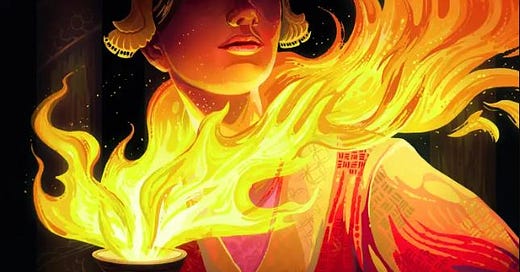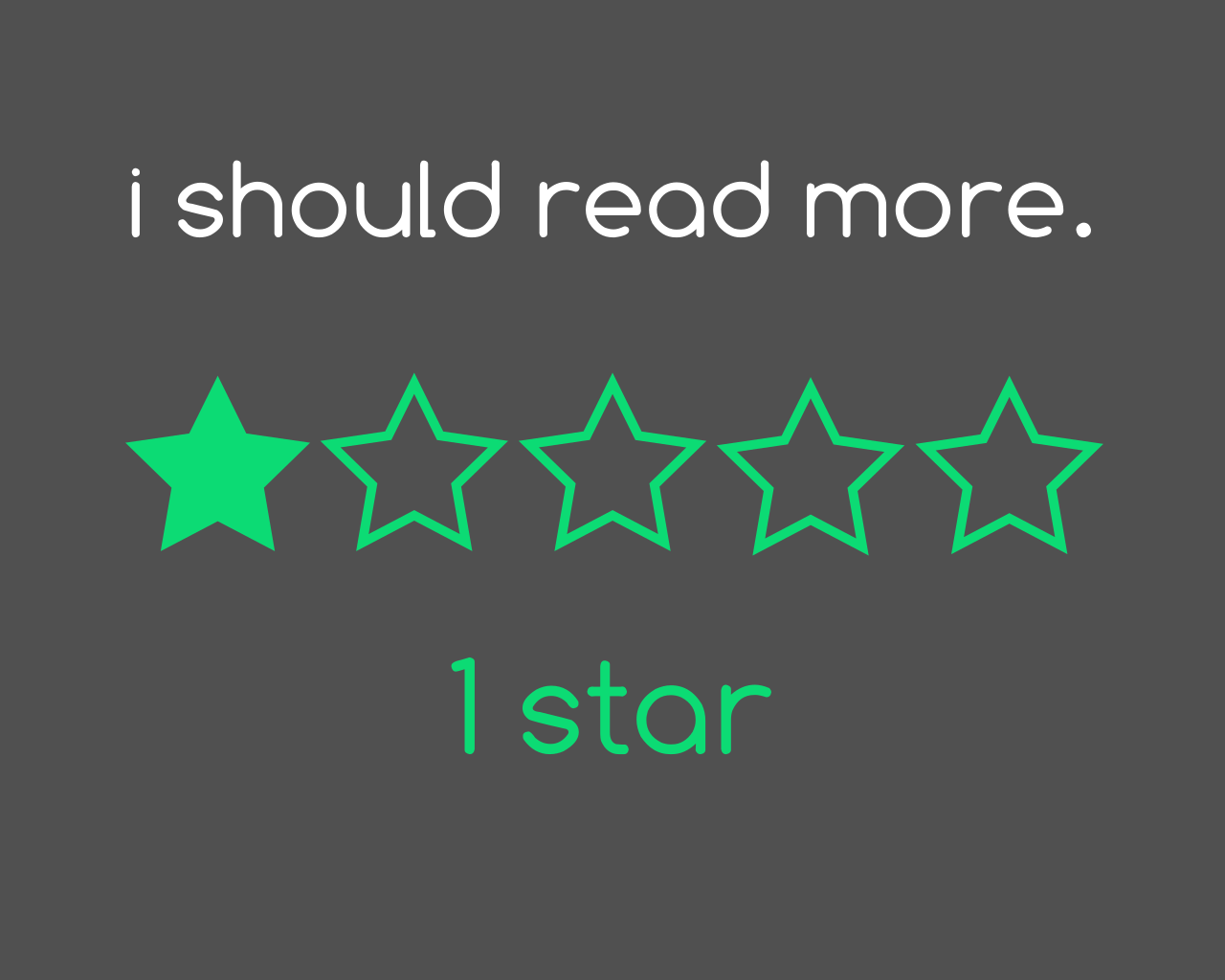Review: Fireheart Tiger by Aliette de Bodard (2021)
A romantic fantasy that attempts to be fiery but smothers itself.
Fireheart Tiger is a fantasy-romance novella by Aliette de Bodard. It was a finalist for the 2022 Hugo Award for Best Novella.
The story focuses on Thanh, a princess of the Vietnamese-inspired country of Bình Hải. Thanh spent several years of her childhood as a ward of Ephteria, a powerful northern country with grand colonial ambitions. While a ward, Thanh had a romance with Ephteria’s Princess Eldris, heir to the throne.
Now back in Bình Hải, Thanh has been struggling with a return to life in her home country, partially due to things mysteriously catching fire around her. She prepares alongside her mother as an official delegation from Ephteria visits to negotiate new demands. To Thanh’s surprise, Princess Eldris leads the negotiation, complicating her role as old flames get rekindled during the meetings. Thanh has to manage these complexities while discovering that the mysterious fires are more than they appear.
Fireheart Tiger brings several promises to the table: a fantasy setting inspired by Vietnam and Southeast Asia, political intrigue and romance, themes around colonialism, power dynamics in relationships, and a conflict between self-identity and a dedication to filial piety. This has all the makings of a good, if not great, story - and Fireheart Tiger fails to deliver on a single one.
A Southeast Asian fantasy? Sign me up! I’d read a trilogy. Sadly, we get very, very little. There is almost no description of the setting aside from the occasional statue or insignia that is described. The reader has no idea what makes Bình Hải unique by the end - they never meet a single ordinary citizen, the landscapes are never explored, the culture is never investigated (outside of having merchants, rulers, and a strong sense of filial piety). There are some vague references to a port city and some haunted ruins during negotiations. That’s it. de Bodard’s approach to world-building seems constrained to info-dumps - there is no organic discovery here. For instance, when it comes to describing the neighboring polities:
“Xứ Quỳnh Hoa is small and landlocked, but its warriors are fierce, and Ngân Kỳ… The Ngân Kỳ are Bình Hải’s former masters, before the Hải declared their independence and made themselves a space of their own on the continent. They’ve had two centuries of freedom, but now Ngân Kỳ itself is weak, beset by internal wars, and the northerners are encroaching there, too.”
That’s pretty much it. Proper nouns thrown out alongside some facts, and you move on. I couldn’t help but compare this to P. Djèlí Clark’s A Dead Djinn in Cairo: a short story that is a quarter of Fireheart’s length, that oozes with worldbuilding and culture - painting a vivid picture of Middle-Eastern fantasy with so much less room to work with. The most Vietnamese-inspired scene de Bodard gives us is Thanh playing cờ tướng (also known as xiangqi, or “Chinese Chess”) with her mother, which just simply mentions some of the different pieces and the board before descending into a common chess analogy.
” “I did.” Mother’s voice is faintly puzzled. “I don’t see—”
“You don’t?” Thanh’s hand shows the board: Mother’s scattered pieces, her own disarrayed army. She moves her general to face Mother’s general across the board—a forbidden move, slowly and deliberately made to see the way Mother winces. “We’re fighting each other and in the end the board is clear for them to win”. “
The promises of romance and intrigue are also bare. de Bodard plays at a romance in the book - but no work is put into it, so it lacks verisimilitude entirely. Thanh and Eldris don’t fall in love, they’re already in love. Why? How? Well, one time Eldris gave Thanh a rose, and they had sex. She’s hot, alright? There are no demonstrations of kindness, no blossoming romance - you are simply told the facts. It is passion without meaning. They have four (maybe five) conversations in total.
“ “Sssh,” Eldris says. She lays a finger on Thanh’s lips, stilling them. Her smile is wide and infectious. “I’ve gone hungry for far too long, Thanh. And so have you. Haven’t you?” ”
Intrigue? Nonexistent. No clear conflict is ever explained in detail enough to matter. Because the backing world is so empty, any diplomatic point of contention is meaningless. There is a scene where Thanh gets blackmailed, and then 18 pages later she admits to the secret, nullifying it before it matters. There are vague statements about problems and potential solutions, before everything is wrapped up in a nice bow at the end. There is nothing here.
So.. we’re left without an interesting world, without meaningful romance, and without an intrigue plot. What’s left?
Characters? Even if the relationships are thin, are the characters well written? No. They’re a list of bullet points personified, cardboard cutouts. Thanh is angry about being a ward. She wants to show her independence and competence yet feels constrained by her obligation to obey her mother. That’s it, and she’s the deepest character by a mile.
Themes? Let’s look at the major one: Thanh’s fierce disposition and personal identity clashing with cultural demands for filial piety. This could be very interesting! (It was the theme of Pixar’s Turning Red, which was great). Yet it’s treated with the same detached fact-telling as the rest of the book. Sometimes Thanh wants to do something, and expresses she is worried about what how her mother would see her. There is no back-and-forth conflict here that makes this struggle meaningful, no clashes that ask the reader to contemplate the themes. Problems are announced and then resolved, in a bizarrely quick fashion.
“She’s Thanh’s living ancestor and her elder, and she’s owed not only respect but also filial piety, that of a subject for her empress, and that of a daughter for her mother.” (page 29)
“ “We need options!”, Thanh says, finally throwing filial piety, and caution, to the winds.” (page 30)
You may be wondering why Thanh's actions have to be so explicitly spelled out - we were just told about the importance of respecting your elders on the previous page, surely we don't need to have it stated that her outburst violates it. However, this is writing that avoids subtlety at an extreme that I have never seen. Each emotion is stated. If a character is confused, it is specified that they are confused, after dialogue showing confusion. The words “filial piety” are used each time the theme is referenced. Every. Time.
“ “We’ve done nothing,” Thanh says. She feels chilled, and trapped.”
This fear of subtlety plagues the dialogue as well. Each conversation takes paragraphs to cover a few lines, because every sentence is followed by an exaggerated description of what feelings are occurring. At no point in the story was I ever remotely surprised at a line, because after every sentence, the next is telegraphed. It’s a jarring, exhausting feeling reading this. It is often closer to a screenplay than literature: you are describing how the actors react after each line; there is no trust in the reader to understand any complexity. The end result is sanitized dialogue that feels like it was written by a committee.
"“ Please",” Thanh says. Because [they] should be angry. Because [they] should be blaming her. Because—because anger is easier, and compassion hurts so much. And, because she knows no other way, she says, “I don’t know why you’d care so much about hurt. It’s not like you’d know what it means”. “
I fully admit that I am not the target audience here. I wouldn’t have picked up this particular novella if it weren’t for the Hugo nomination (although I have been eyeing de Bodard’s work for a while). But I can say that about a lot of nominated works, and I’ve never had one bounce this hard off me in such a comprehensive way. Overall it’s one of the worst-written books I’ve ever read. I have to believe that readers who yearn for diverse fantasy romances still have standards, and I have to believe that de Bodard, whom I’ve heard so much about, can do better than this.
This was a difficult review to write. Normally, you have some good to say about a work. You can squint and see the appeal in it. You can balance out the blistering bad with a salve of compliment. The best I can say about this is that the idea had potential. At one point, there is a hint that the work might examine the imbalance of power in Thanh and Eldris’ relationship, which would’ve been an interesting angle but it’s not explored. The book is defined by missed opportunities.
I’ve read 111 speculative fiction books since I got back into reading a few years ago. This is only the fourth to earn a 1-star review.
You may still like Fireheart Tiger if:
You want a fast tale with a diverse main character.
You are alright with romances where the characters are in love at the start.
You really want to see something set in a fantastical Southeast Asia, and don’t care much about depth in worldbuilding






Agree wholeheartedly with what you wrote. My review went "DNFed at 55%. Everything I dislike about Fantasy as a genre. Lots of superfluous world building delivered in info dumps. Intrigue that doesn’t intrigue. Romance between enemies. I am not the audience for this. "